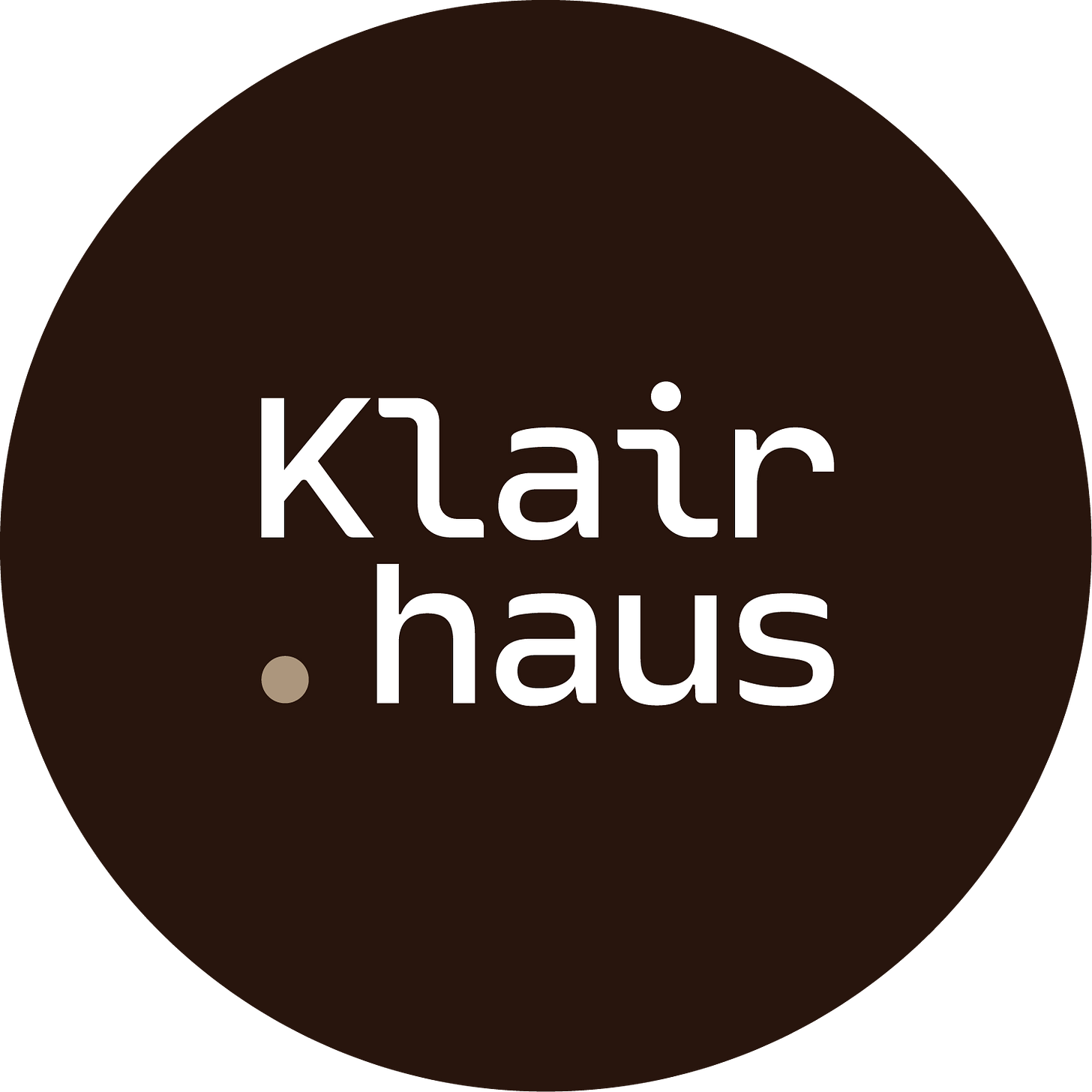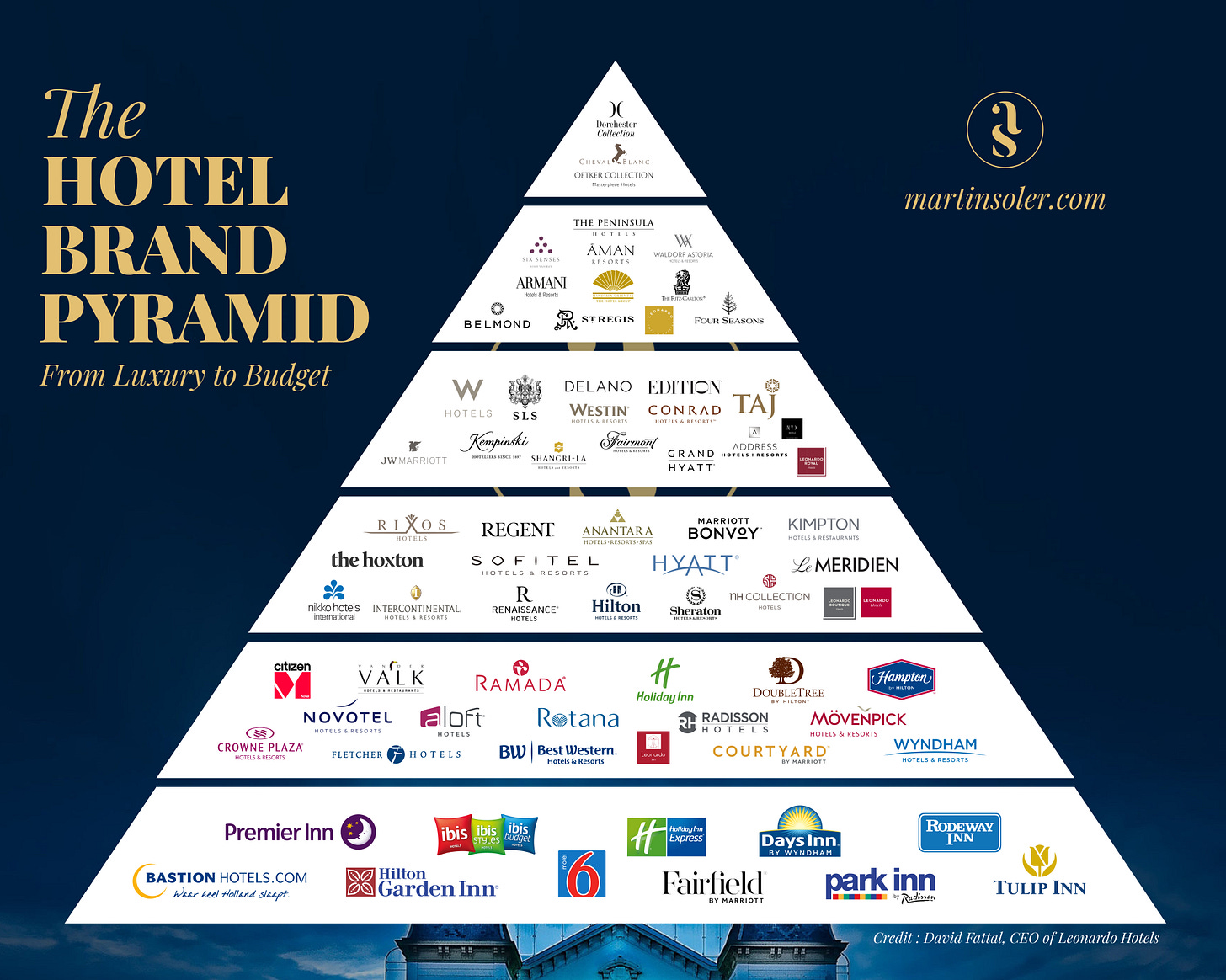87 - The Hotel Brand Pyramid
The hotel brand pyramid, clarity after all? Marriott just added an outdoor brand. 10 commandments for 2025. Influencers and trust issues. Plus more.
Hello,
Holidays are just around the corner, there will not be a newsletter next week, but I’ll be working on the annual media review which I’ll send out for the new year. Wishing you a really great holiday break.
Best, Martin
Sponsored by Klairhaus. Support the newsletter, treat someone to great office gadgets.
Marriott, more brands?
Marriott is expanding its portfolio with the acquisition of Postcard Cabins and a franchise agreement with Trailborn. Interesting growth concept. It can help turn the hotel brand into a source of inspiration of where to go, rather than a commodity for where one is already going. Of all the hotel brands, they do have the most varied history in product lines. And yes it is another label in their stable. See the pyramid of hotel brands below.
EXPANDING OUTDOORS
Online Booking Tools vs AI
Business travel has always been the easiest target for AI booking. It has rules, conditions, boundaries - everything that a system needs. Leisure travel has huge levels of variants that are harder to predict. Cohorts are great, until you’re thrown into one that make no sense. But are the online booking tools on the way out?
OBTs DECLINE
About me: I'm a fractional CMO for large travel technology companies helping turn them into industry leaders. I'm also the co-founder of 10minutes.news a hotel news media that is unsensational, factual and keeps hoteliers updated on the industry. 10 Commandents for hotels in 2025
How should hotels develop in 2025? Where should they focus brand, experience, operations, design upgrades etc. Some takeaways: Recognition, recognition, recognition. Building up the “Only Here” aspect. The list is short, but has room for inspiration.
HOTEL STRATEGY COMMANDMENTS
Influencer trust issues
A survey of German consumers says they are increasingly skeptical of the credibility of online travel tips, with a preference for recommendations from friends and family. Only 8% are inspired by travel content on Instagram or YouTube, and many find social media travel suggestions exceed their budget. Is this limited to Germany?
INFLUENCER IMPACT [GERMAN ARTICLE]
Skyscanner’s new ad platform
Skyscanner has introduced an Ads Platform that leverages first-party data from its vast user base to deliver contextual advertising. With over 110 million monthly travelers, the platform aims to target the 51% of users who are undecided about their travel plans. This new platform could be a strategic tool for hotels to increase their market share by targeting undecided travelers not only drive direct bookings but also to strengthen their brand identity in a privacy-conscious way?
TRAVEL ADVERTISING PLATFORM
Podcast: I was invited on the Hospitality Daily Podcast and spoke about technology in hospitality, some thoughts on what wont change in hospitality, and why I co-founded 10minutes.news. Best, MartinOpinion
So what is a hotel brand really?
A year ago, I shared some thoughts on how the hotel industry struggles to build genuine brands. I argued that most “brands” in hospitality are manufactured identities with little depth or long-term investment behind them. Despite clever names and glossy brochures, hotels too often lack the persistent narrative and consistent execution that true brand-building requires.
Since then, I came across the “Hotel Brands Pyramid” (presented by the CEO of Leonardo hotels, to give credit where credit is due). This framework tries to position the brands according to their place in the quality and experience spectrum. For consumers, at least, it brings a bit of clarity.
Now, instead of squinting at a laundry list of unfamiliar hotel sub-brands per “holding company” and trying to guess their defining traits, the pyramid helps us see where each offering fits into the overall market. It’s not perfect—some brand nuances still feel arbitrary—but it’s a step toward something tangible. In a world where Marriott, Hilton, Accor, and IHG spawn new brand identities at will, this simple, structured hierarchy might be the closest thing we have to meaningful differentiation.
Don’t get me wrong: this doesn’t solve the fundamental problem I highlighted last year. Creating a true brand still demands a clear narrative, relentless consistency, and constant reinforcement—efforts the hotel industry often shies away from. The pyramid won’t magically transform a scattershot approach into a focused brand strategy. But it does at least help us, as consumers, navigate the chaos, making it a bit easier to “get” what a Kimpton or a Sofitel might mean in the grand scheme.
In the end, many hotel brands remain wrappers for investment vehicles, rather than deeply built, consumer-centric identities. The Hotel Brands Pyramid doesn’t solve that, but it’s a reminder that there are ways to bring a measure of logic and comparability to a world where brand building is still too often an afterthought. Maybe that’s a start.









